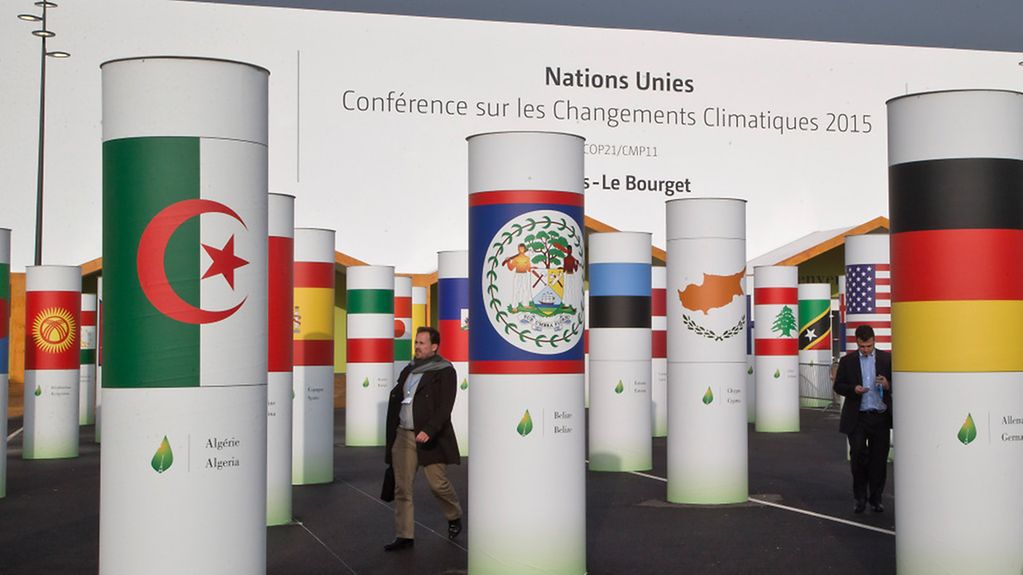UN Climate Change Conference in Paris
The 195 states represented in Paris have agreed on a new climate agreement. "Paris will always be linked with this historic watershed in global climate policy," declared the Chancellor, praising the outcome of negotiations.
3 min reading time

UN Climate Change Conference comes to a successful conclusion: new agreement signed in Paris on Saturday
Photo: picture alliance / AP Photo
At the UN Climate Change Conference in Paris, 195 states adopted a new agreement to combat global warming on Saturday evening. "The agreement is adopted," declared conference president, Laurent Fabius, French Foreign Affairs Minister, as the delegates applauded. For the first time ever, this agreement commits all countries to take climate action. It will come into effect in 2020.
"Under the provisions of the climate agreement adopted here today, the entire international community has, for the first time, undertaken to act – to act to fight global climate change," said Chancellor Angela Merkel, welcoming the outcome of the 14-day negotiations at the UN Climate Change Conference. Although "we have a lot of work ahead of us" the successful conclusion of the conference is "a sign of hope that we will manage to protect the living conditions of billions of people in future too".
We have made history, says Barbara Hendricks
Federal Environment Minister Barbara Hendricks declared the agreement as a historic success for climate change mitigation. "Today all of us here have together made history. Billions of people have waited for a long time for the global community to take action. Today I can say – things are moving at last." For the first time ever, all countries have affirmed their commitment to climate action and to addressing climate change. All states have accepted the need to limit global warming, said Barbara Hendricks immediately after the conference.
The agreement bridges the out-dated dichotomy between industrialised and developing nations. "Over the last few days we have seen how a new coalition of the ambitious has formed, with poor and rich, large and small states. We will build on this in our efforts to achieve ambitious climate protection and worldwide solidarity," said the Federal Environment Minister.
The most important outcomes of Paris
- The states have set themselves the goal to keep global temperature rise down to "well below" two degrees Celsius as compared with the pre-industrialised era. Efforts are to be made to halt temperature rise at 1.5° C.
- In the second half of this century, a balance is to be achieved between anthropogenic greenhouse gas emissions and the removal of CO2 from the atmosphere in what is known as carbon sinks, i.e. forests but also underground carbon sequestration. According to climate scientists this would bring net emissions down to zero.
- Before the UN Climate Change Conference, 186 states voluntarily submitted their national climate targets. The measures proposed in these targets will not, however, be enough to keep temperature rise to below 2°C. The agreement provides for these self-imposed targets to be reviewed and tightened every five years as of 2023.
- The states have agreed a common system of reporting commitments and transparency regulations. Every country is to submit a report on its CO2 emissions. The different preconditions and capacities of the different countries are taken into account. This ensures that poor countries are not required to meet the same requirements as rich nations in the statistic recording of CO2 emissions, for instance.
- Many developing countries, including small island states, are threatened by climate change. Sea levels are rising, droughts and extreme weather events are becoming more frequent and more severe. The Paris agreement assures them of support, in the form of early warning systems and climate risk insurance, for instance.
- Industrial states are to support poor states in climate change mitigation and adaptation measures. Other states – meaning primarily emerging economies - are "encouraged" to make voluntary financial contributions.
- In an auxiliary decision, the pledge of industrialised countries to provide 100 billion US dollars a year as of 2020 for poor countries is reaffirmed. This sum is to be made available every year until 2025.